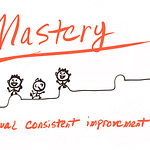We left off last week in Industry 2.0 with the assembly line, the great grandaddy of lean manufacturing, of lean production, of product systems thinking, and of optimization of systems of production.
The thing is, as we’ve already discussed, production - of goods and services, let’s say - is at the center of what gets traded in markets, and is therefore at the center of our brief history’s hockey stick. After Henry Ford was born around the mid 19th century, we really started cooking with gasoline in terms of helping people escape extreme poverty around the world in the mid 20th century.
Profound Systems Thinking
This was right around the time that the impacts of the first two heroes of lean production - W. Edwards Deming and Taiichi Ohno - were making themselves felt around the world. Certainly, correlation is not causation here in terms of lifting billions out of extreme poverty, but the dreaming domain hopper that I am can’t help but intuit that these guys, especially Deming, who was born in the year 1900, discovered and laid out something so fundamental to the optimization of complex systems, something that went so far beyond production with atoms and value creation in physical marketplaces, that it not only led to everything lean that came after with bits (wait for next week’s article!), but to something, well, much more profound.
Our tangential case in point: near the end of his life and in the year of his death, 1993, Deming shared his life's conclusions on lean production, continuous improvement, and thinking and learning in general through the lens of his proprietary systematic approach to value creation, which he laid out in his book The New Economics. Fittingly, he formalized a succinct system that appears to be, I daresay, at the root of all things production, value creation, and problem-solving: that is, he outlined the System of Profound Knowledge.
Epic, right? It had four primary aspects:
Systems thinking, because “without an aim, there is no system.” Formulated another way by another great thinker we’ll meet shortly, we cannot optimize a system without subordinating everything in the system to the constraint. In fact, if you ask Peter Drucker, to make effective executive decisions is above all a matter of system, “of the right steps in the right sequence.”
Statistical thinking, because random variation is different than system variation (or as the academics would tell you aleatory uncertainty is different than epistemic uncertainty). In other words, some stuff is fixable, while some is not.
Scientific thinking, because hypotheses, experiments, and understanding that we only ever fail to reject or reject hypotheses is actually pretty important if you want to determine what is actually true.
Applications of Psychology, because humans are ridiculous. As Scott Adams says “people don’t need real reasons"
The point here is that Deming’s thinking affected everyone that we’ll meet for the remainder of this series, yes even Steve Blank, Eric Ries, and the DevOps people. But that’s for another day.
OK back to the foundational thinking of Ford, who built not only the assembly line and many, many other amazing production systems, but also laid out in explicit detail all of his philosophies about business and life in his seminal life’s work, Today and Tomorrow, which served as something like guiding scripture for Taiichi Ohno as he worked to build what would become known as TPS, the Toyota Production System.
I’m going to get all principled on now you because we need to keep this thing as a truly “brief” history, so the next few minutes will read quite aphoristically. Welcome to the birth of lean philosophies.
First up, Ford’s thinking, by the chapter headings of his book, Today and Tomorrow.
We are being born into opportunity
Is there a limit to big business?
Big business and the money power'
Are profits wrong?
It can't be done
Learning by necessity
What are standards?
Learning from waste
Reaching back to the sources
The meaning of time
Saving the timber
Turning back to village industry
Wages, hours, and the wage motive
The meaning of power
Education for life
Curing or preventing
Making a railroad pay
The air
Farm problems are farm problems
Finding the balance in life
What is money for?
Applying the principles to any business
The wealth of nations
Why not
Now consider Taiichi Ohno. He has Seven Wastes that guided his thinking and optimization of the system that became TPS, and he also outlined Ten Precepts to “think and act to win.” We’ll consider both here.
The Seven Wastes
Delay, waiting or time spent in a queue with no value being added
Producing more than you need
Over processing or undertaking non-value added activity
Transportation
Unnecessary movement or motion
Inventory
Defects in the product
Now for the quite profound (in their own right) and wide-ranging Ten Precepts
You are a cost. First reduce waste.
First say "I can do it." And try before everything
The workplace is a teacher. You can find answers only in the workplace.
Do anything immediately. Starting something right now is the only way to win.
Once you start something, persevere with it. Do not give up until you finish it.
Explain difficult things in an easy-to-understand manner. Repeat things that are easy to understand.
Waste is hidden. Do not hide it. Make problems visible.
Valueless motions are equal to shortening one's life.
Re-improve what is improved for further improvement.
Wisdom is given equally to everybody. The point is whether one can exercise it.
And now for a quick reminder of the Deming System of profound knowledge: systems thinking, statistical thinking, scientific thinking, and psychology.
OK ok ok, we’re getting pretty meta. Can you see how this is going to re-intersect our first article by the end? I’m working on my not-so-subtle-nor-obvious foreshadowing game. It still needs a lot of polish. I just need to…continuously improve, I suppose.
Tryna keep it lean, I’ve got one more thread to pull into this discussion.
On Automation
Remember we talked about subtractive manufacturing last time? Well, if you’ve ever used a manual mill or lathe - that is, if you’ve ever used a machine tool - then it becomes infinitely obvious that what is needed to get shit done faster is automation.
Now I want to briefly address the elephant in the room. I know that often lean manufacturing and especially highly efficient production systems that are lean and leverage humans while aiming at nearly zero waste constantly are often considered less than human (re: American Factory, which by the way, is still right down the street from many of the houses that I’ve lived in over the past 15 years in Dayton, Ohio).
But these are complex issues and cannot be viewed simply from the outside by someone who is not walking in the shoes of a skilled manufacturing professional. In my current role as a product manager for FactoryFix, a manufacturing jobs platform, I get to speak with skilled professionals all over America who want nothing more than to be able to operate production machines that they are experts at operating. Some of us who have never done this sort of thing might think that that sort of work is not desirable, is somehow worth less than doing something else in a digital space (which too, btw, can likely be automated, #ai and machine learning). However, if you talk to people who have the expertise, a mastery developed over time at running a particular machine or set of complex machines, there is massive pride in that. And if you truly study the Toyota production system and the ideas that drove its creation, the learning that occurs on the shop floor by the individual workers is fundamentally the learning that improves the system. In short, in my humble opinion, people have, in many cases, screwed up the incentives for the skilled workers who help produce the goods and services that make and power our world.
This set of problems dovetails into a larger issue that most of the stuff that we use as Americans is not actually produced anywhere close to where it is consumed. From a lean systems-thinking perspective, and indeed from energy and environmental perspectives, this is wasteful as well.
But alas, I don’t think that any of this fundamentally means that automation is evil or something that we should not be excited about. In fact, do you remember those original wooden tools of artisans? The potting wheel, for instance? That was automation. It’s just kept going; kept evolving; just like us, and just like our systems.
I truly do believe that automation is something that we all must embrace in the 21st century, for only those who embrace automation and work symbiotically with these technologies of further and further abstraction are the ones who will be the meta-makers of the world. In fact, this is already true in digital space today. As Naval says, “there are way more robots than there are humans.”
In Profound Conclusion
So what is lean production anyways? Is it Toyota? Is it lean manufacturing, is it kanban, kata, six sigma? What is lean six-sigma anyways?
Is it just for the operations side of the house or does it take a holistic view of the business? Is it just a holistic view of the business or does it transcend business models and actually embed itself into the very fabric of the culture?
Well, we can’t quite answer that yet, but I’m sure that you’re starting to get some idea, dear reader. Next week we’ll pick up with the next layer of abstraction that began to occur around the time when Toyota and their production system really started crushing it; that is, when lean optimization started to become a little less physical and a little more digital with the advent of commercial software systems for production planning.
In short, the digital revolution and data started to pave the way from the 20th century into the 21st.
Let’s end this long one with some dope unautomatable quotes!
Ready? Here we go.
“If an organization wants to thrive by continually improving and evolving, then it needs systematic procedures and routines (methods) that channel our human capabilities and achieve the potential. Such routines would guide and support everyone in the organization by giving them a specific pattern for how they should go about sensing, adapting, and improving.” ~ Mike Rother, Toyota Kata
"Waste is also created when providing higher value quality products or services than is necessary." ~ Jeffery Liker, The Toyota way
“The question ‘what can we do?’ often results in scattershot improvement attempts. The more difficult and focused question is ‘what do we need to do?’” ~ Mike Rother, Toyota Kata
"Lean organization must come before high-tech robotic process automation." James P. Womack, Daniel T. Jones, and Daniel Roos, The Machine that Changed the World
















